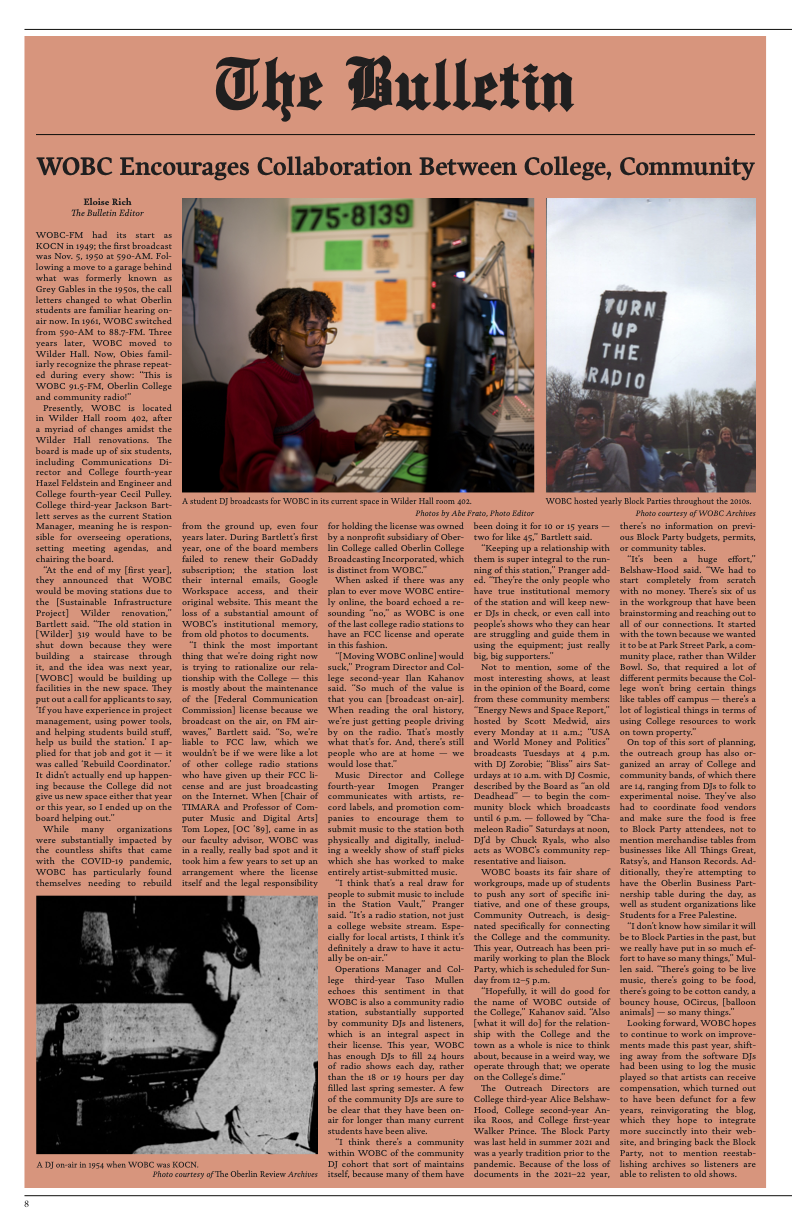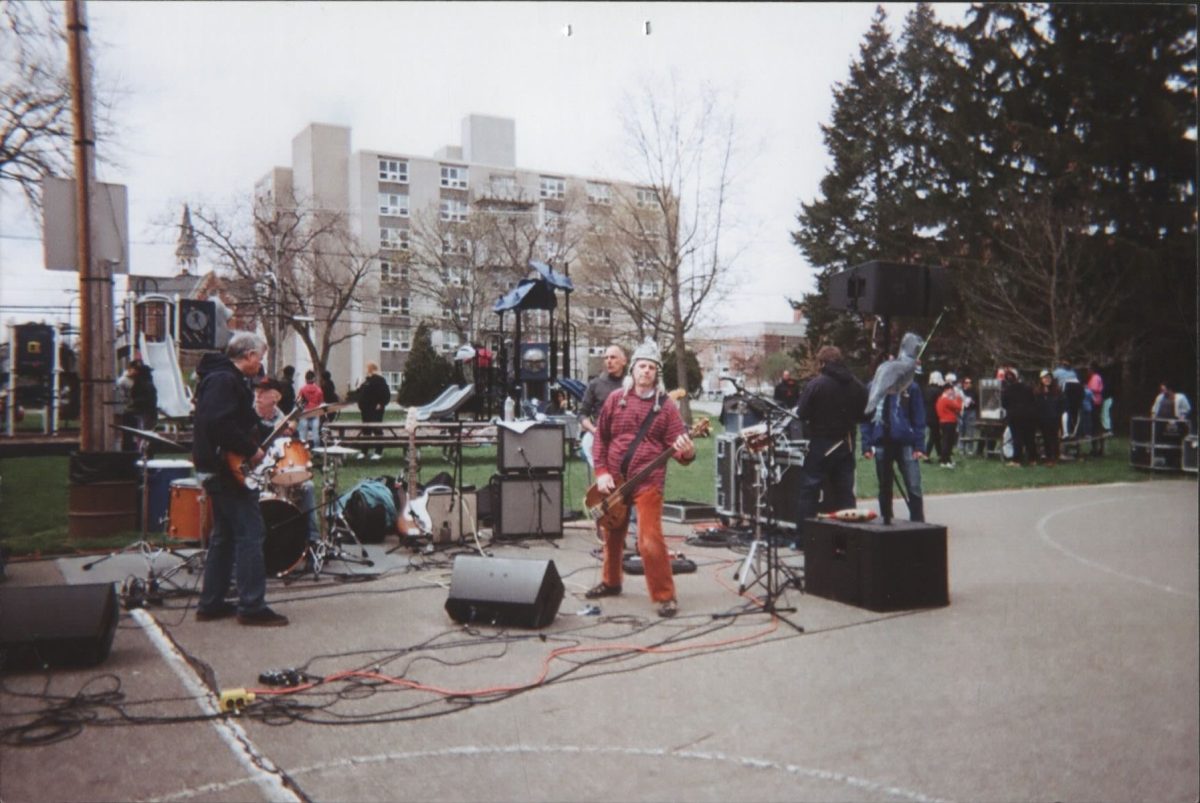WOBC-FM had its start as KOCN in 1949; the first broadcast was Nov. 5, 1950 at 590-AM. Following a move to a garage behind what was formerly known as Grey Gables in the 1950s, the call letters changed to what Oberlin students are familiar hearing on-air now. In 1961, WOBC switched from 590-AM to 88.7-FM. Three years later, WOBC moved to Wilder Hall. Now, Obies familiarly recognize the phrase repeated during every show: “This is WOBC 91.5-FM, Oberlin College and community radio!”
Presently, WOBC is located in Wilder Hall room 402, after a myriad of changes amidst the Wilder Hall renovations. The board is made up of six students, including Communications Director and College fourth-year Hazel Feldstein and Engineer and College fourth-year Cecil Pulley. College third-year Jackson Bartlett serves as the current Station Manager, meaning he is responsible for overseeing operations, setting meeting agendas, and chairing the board.
“At the end of my [first year], they announced that WOBC would be moving stations due to the [Sustainable Infrastructure Project] Wilder renovation,” Bartlett said. “The old station in [Wilder] 319 would have to be shut down because they were building a staircase through it, and the idea was next year, [WOBC] would be building up facilities in the new space. They put out a call for applicants to say, ‘If you have experience in project management, using power tools, and helping students build stuff, help us build the station.’ I applied for that job and got it — it was called ‘Rebuild Coordinator.’ It didn’t actually end up happening because the College did not give us new space either that year or this year, so I ended up on the board helping out.”
While many organizations were substantially impacted by the countless shifts that came with the COVID-19 pandemic, WOBC has particularly found themselves needing to rebuild from the ground up, even four years later. During Bartlett’s first year, one of the board members failed to renew their GoDaddy subscription; the station lost their internal emails, Google Workspace access, and their original website. This meant the loss of a substantial amount of WOBC’s institutional memory, from old photos to documents.
“I think the most important thing that we’re doing right now is trying to rationalize our relationship with the College — this is mostly about the maintenance of the [Federal Communication Commission] license because we broadcast on the air, on FM airwaves,” Bartlett said. “So, we’re liable to FCC law, which we wouldn’t be if we were like a lot of other college radio stations who have given up their FCC license and are just broadcasting on the Internet. When [Chair of TIMARA and Professor of Computer Music and Digital Arts] Tom Lopez, [OC ’89], came in as our faculty advisor, WOBC was in a really, really bad spot and it took him a few years to set up an arrangement where the license itself and the legal responsibility for holding the license was owned by a nonprofit subsidiary of Oberlin College called Oberlin College Broadcasting Incorporated, which is distinct from WOBC.”
When asked if there was any plan to ever move WOBC entirely online, the board echoed a resounding “no,” as WOBC is one of the last college radio stations to have an FCC license and operate in this fashion.
“[Moving WOBC online] would suck,” Program Director and College second-year Ilan Kahanov said. “So much of the value is that you can [broadcast on-air]. When reading the oral history, we’re just getting people driving by on the radio. That’s mostly what that’s for. And, there’s still people who are at home — we would lose that.”
Music Director and College fourth-year Imogen Pranger communicates with artists, record labels, and promotion companies to encourage them to submit music to the station both physically and digitally, including a weekly show of staff picks which she has worked to make entirely artist-submitted music.
“I think that’s a real draw for people to submit music to include in the Station Vault,” Pranger said. “It’s a radio station, not just a college website stream. Especially for local artists, I think it’s definitely a draw to have it actually be on-air.”
Operations Manager and College third-year Taso Mullen echoes this sentiment in that WOBC is also a community radio station, substantially supported by community DJs and listeners, which is an integral aspect in their license. This year, WOBC has enough DJs to fill 24 hours of radio shows each day, rather than the 18 or 19 hours per day filled last spring semester. A few of the community DJs are sure to be clear that they have been on-air for longer than many current students have been alive.
“I think there’s a community within WOBC of the community DJ cohort that sort of maintains itself, because many of them have been doing it for 10 or 15 years — two for like 45,” Bartlett said.
“Keeping up a relationship with them is super integral to the running of this station,” Pranger added. “They’re the only people who have true institutional memory of the station and will keep newer DJs in check, or even call into people’s shows who they can hear are struggling and guide them in using the equipment; just really big, big supporters.”
Not to mention, some of the most interesting shows, at least in the opinion of the Board, come from these community members: “Energy News and Space Report,” hosted by Scott Medwid, airs every Monday at 11 a.m.; “USA and World Money and Politics” broadcasts Tuesdays at 4 p.m. with DJ Zorobie; “Bliss” airs Saturdays at 10 a.m. with DJ Cosmic, described by the Board as “an old Deadhead” — to begin the community block which broadcasts until 6 p.m. — followed by “Chameleon Radio” Saturdays at noon, DJ’d by Chuck Ryals, who also acts as WOBC’s community representative and liaison.
WOBC boasts its fair share of workgroups, made up of students to push any sort of specific initiative, and one of these groups, Community Outreach, is designated specifically for connecting the College and the community. This year, Outreach has been primarily working to plan the Block Party, which is scheduled for Sunday from 12–5 p.m.
“Hopefully, it will do good for the name of WOBC outside of the College,” Kahanov said. “Also [what it will do] for the relationship with the College and the town as a whole is nice to think about, because in a weird way, we operate through that; we operate on the College’s dime.”
The Outreach Directors are College third-year Alice Belshaw-Hood, College second-year Anika Roos, and College first-year Walker Prince. The Block Party was last held in summer 2021 and was a yearly tradition prior to the pandemic. Because of the loss of documents in the 2021–22 year, there’s no information on previous Block Party budgets, permits, or community tables.
“It’s been a huge effort,” Belshaw-Hood said. “We had to start completely from scratch with no money. There’s six of us in the workgroup that have been brainstorming and reaching out to all of our connections. It started with the town because we wanted it to be at Park Street Park, a community place, rather than Wilder Bowl. So, that required a lot of different permits because the College won’t bring certain things like tables off campus — there’s a lot of logistical things in terms of using College resources to work on town property.”
On top of this sort of planning, the outreach group has also organized an array of College and community bands, of which there are 14, ranging from DJs to folk to experimental noise. They’ve also had to coordinate food vendors and make sure the food is free to Block Party attendees, not to mention merchandise tables from businesses like All Things Great, Ratsy’s, and Hanson Records. Additionally, they’re attempting to have the Oberlin Business Partnership table during the day, as well as student organizations like Students for a Free Palestine.
“I don’t know how similar it will be to Block Parties in the past, but we really have put in so much effort to have so many things,” Mullen said. “There’s going to be live music, there’s going to be food, there’s going to be cotton candy, a bouncy house, OCircus, [balloon animals] — so many things.”
Looking forward, WOBC hopes to continue to work on improvements made this past year, shifting away from the software DJs had been using to log the music played so that artists can receive compensation, which turned out to have been defunct for a few years, reinvigorating the blog, which they hope to integrate more succinctly into their website, and bringing back the Block Party, not to mention reestablishing archives so listeners are able to relisten to old shows.



